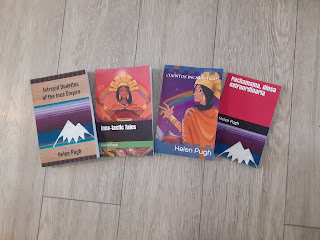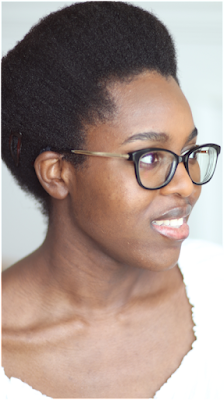Helen Pugh interview
AUTHOR INTERVIEW
A little introduction:
The author of 'Intrepid Dudettes of the Inca Empire' and ‘Inca-tastic Tales’, Helen Pugh has long believed in the importance of rescuing historical women from obscurity. With an honour’s degree in Spanish and Italian from Bristol University, she embarked on a quest to discover the forgotten women of the Inca Empire.
When did your love of books begin?
From as early as I can remember, I've always loved reading. And even before my memories start, I'm told that aged 2, I would sit outside my older brother's nursery classroom and read the alphabet to my mum from a poster on the wall. Books were always a great escape for me in my childhood and I started writing stories aged 7.
When did you start to have the wish to become an author?
From about the age of 8! It's always been in my heart.
How have you found the process for becoming an author?
In my case, the research can be really tricky as I'm looking into women who are semi-hidden in the history books. It takes a lot of digging around to find them. But it's so worth it when I manage to piece together their fascinating lives.
Formatting and marketing have certainly been a learning curve and it's not something you consider when you dream of being a writer. But with some patience and perseverance, you get there in the end!
What would you say to those wanting to become an author?
I'd tell them about self-publishing because I don't think it's widely known that you can publish a book 100% by yourself these days.
Tell us about your book/books:
So far, my books have all centred around Inca women who lived fascinating lives many centuries ago and who were unfairly edited out of many traditional historical accounts.
For adults, there's Intrepid Dudettes of the Inca Empire. You can download a free chapter from hpugh.webador.co.uk. This book takes the reader on a journey of roughly 300 years of South American history. It starts off with Pachamama, who is the Inca’s version of Mother Nature, their fertility goddess, then I outline other goddesses and the intersex creator deity. Next, I move on to the women. The stories about the earlier women are quite fantastical- you have a miraculous healing, tears of blood, people formed out of clay and so on. Then the women who lived closer to the Spanish Conquest are a bit more realistic. I describe some girls who were naturally mummified in the Andes mountains and narrate stories about some members of the Inca royalty. The second part deals with the women who were alive during the Spanish Conquest. There’s an Inca priestess, a local leader, various princesses and rebel leaders. Finally, I look at Inca culture in the 21st century and how despite all the Spaniards’ attempts to repress Indigenous traditions, many aspects are still around today. For example, people still worship Pachamama alongside their Catholic beliefs and Inca irrigation canals are still in use in certain towns.
The first two chapters are available in Spanish with a book entitled 'Pachamama, diosa extraordinaria'.
My children's book, Inca-tastic Tales, also has a Spanish-language version called 'Cuentos incatásticos'. Inca-tastic Tales is an epic journey through Inca history where adults and children alike can meet gods, goddesses, a magician, queens, kings, princes, princesses, kidnappers, warriors, conquerors, treasure hunters, explorers, heroes and even two volcanoes who are in love. There are 12 well-researched tales for bedtime stories or independent reading for ages 8 and up.
What do you love about the writing/reading community?
Writers' Lifts on Twitter can be very useful ways to get your book out there and connect with more people and finding people who follow hashtags relevant to your books. The most important thing to remember is that the community generally works on reciprocity- a retweet for a retweet, follow for follow, like for like etc. Through the community, I've also learnt a lot about how people respond to posts on the different social media networks- e.g. Instagram is all about creating beautiful pictures, perhaps in a series, perhaps using a similar colour scheme, whereas the focus on Twitter is words. Finally, support can come from the most unlikely places, which is so lovely.
If you could say anything to your readers what would it be?
Thank you so much for taking the time to read these Inca women's stories. The women lived incredible lives and their voices deserve to be heard. It's a great shame that people such as Quispe Sisa and Anawarki aren't household names, whereas their husbands' names (Francisco Pizarro and Pachakutik, respectively) are.
Where can people connect with you?



.jpg)

Comments
Post a Comment